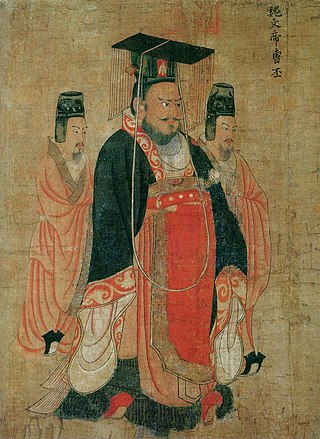
Cao Cao, courtesy name Mengde, was a Chinese statesman, warlord and poet. He was the penultimate grand chancellor of the Eastern Han dynasty, and he amassed immense power in the dynasty's final years. As one of the central figures of the Three Kingdoms period, Cao Cao laid the foundations for what became the state of Cao Wei, and he was posthumously honoured as "Emperor Wu of Wei", despite the fact that he never officially proclaimed himself Emperor of China or Son of Heaven. Cao Cao remains a controversial historical figure—he is often portrayed as a cruel and merciless tyrant in literature, but he has also been praised as a brilliant ruler, military genius, and great poet possessing unrivalled charisma, who treated his subordinates like family.

Cao Pi, courtesy name Zihuan, was the first emperor of the state of Cao Wei in the Three Kingdoms period of China. He was the second son of Cao Cao, a warlord who lived in the late Eastern Han dynasty, but the eldest son among all the children born to Cao Cao by his concubine, Lady Bian. According to some historical records, he was often in the presence of court officials in order to gain their support. He was mostly in charge of defence at the start of his career. After the defeat of Cao Cao's rival Yuan Shao at the Battle of Guandu, he took Yuan Xi's widow, Lady Zhen, as a concubine, but in 221 Lady Zhen died and Guo Nüwang became empress.

Zhang Fei, courtesy name Yide, was a military general serving under the warlord Liu Bei in the late Eastern Han dynasty and early Three Kingdoms period of China. Zhang Fei and Guan Yu, who were among the earliest to join Liu Bei, shared a brotherly relationship with their lord and accompanied him on most of his early exploits. Zhang Fei fought in various battles on Liu Bei's side, including the Red Cliffs campaign (208–209), takeover of Yi Province (212–214), and Hanzhong Campaign (217–218). He was assassinated by his subordinates in 221 after serving for only a few months in the state of Shu Han, which was founded by Liu Bei earlier that year.

Emperor Xian of Han, personal name Liu Xie (劉協), courtesy name Bohe, was the 14th and last emperor of the Eastern Han dynasty in China. He reigned from 28 September 189 until 11 December 220.

Cao Ren, courtesy name Zixiao, was a military general serving during the late Eastern Han dynasty of China under the warlord Cao Cao, who was also his older second cousin. He continued serving in the state of Cao Wei – founded by Cao Cao's son and successor, Cao Pi – during the Three Kingdoms period. He played a significant part in assisting Cao Cao in the civil wars leading to the end of the Han dynasty. He was appointed as the Grand Marshal (大司馬) when Cao Pi ascended the throne, and was also credited by the latter for the establishment of Wei. However, Cao Ren was also once derided as a mediocre commander by Zhu Huan, a general from Wei's rival state Eastern Wu.
Cao Chun, courtesy name Zihe, was a military officer serving under the warlord Cao Cao during the late Eastern Han dynasty of China. He was a younger second cousin of Cao Cao, and is best known for leading the "Tiger and Leopard Cavalry" (虎豹騎), an elite mounted unit, in several battles against Cao Cao's rivals, including Yuan Tan, Tadun and Liu Bei. His elder brother, Cao Ren, also served as a military officer under Cao Cao.
Cao Xiu, courtesy name Wenlie, was a Chinese military general of the state of Cao Wei in the Three Kingdoms period of China. A distant younger relative of the warlord Cao Cao, Cao Xiu started his career in the late Eastern Han dynasty as a military officer under Cao Cao. In the early stages of the Hanzhong Campaign of 217–219, he outwitted Zhang Fei and defeated his subordinate officer Wu Lan (吳蘭). Later in his career, he became a provincial-level military commander and fought in various battles against Wei's rival state, Eastern Wu. He died in 228 shortly after the Wei defeat at the Battle of Shiting.
Cao Jie, formally known as Empress Xianmu, was the last empress of the Eastern Han dynasty of China. She was the second wife of Emperor Xian, the last Han emperor, and became known as the Duchess of Shanyang after her husband's abdication. She was a half-sister of Cao Pi, who ended the Han dynasty by forcing Emperor Xian to abdicate the throne in his favour and established the state of Cao Wei. She fiercely opposed the coup d'état orchestrated by Cao Pi, repeatedly refusing to hand over the imperial seal.
Jia Chong, courtesy name Gonglü, was a Chinese politician who lived during the late Three Kingdoms period and early Jin dynasty of China. He started his career as an advisor to Sima Shi and Sima Zhao, the regents of the state of Cao Wei in the Three Kingdoms era, and subsequently served as an official in the court of Sima Zhao's son, Sima Yan, after the establishment of the Jin dynasty.
Cao Song, courtesy name Jugao, was an official who lived during the Eastern Han dynasty of China. He was the foster son of the eunuch Cao Teng and the father of the warlord Cao Cao, who rose to prominence in the final years of Eastern Han and laid the foundation of the state of Cao Wei in the Three Kingdoms period. Cao Song was posthumously honoured as "Emperor Tai" by his grandson Cao Pi in 220 when the latter ended the Han dynasty and founded the Cao Wei regime.
Cao Bao was a military officer serving under Tao Qian, the Governor of Xu Province, during the late Eastern Han dynasty of China. He became a subordinate of Tao Qian's successor, Liu Bei, after Tao's death in 194. He was killed by Zhang Fei in 196 after a quarrel.
Huan Jie, courtesy name Boxu, was a Chinese official who lived during the late Eastern Han dynasty and served under the warlord Cao Cao. After the fall of the Eastern Han dynasty, he briefly served in the state of Cao Wei during the Three Kingdoms period.
Wang Zhong was a military general of the state of Cao Wei during the Three Kingdoms period of China. He previously served under the warlord Cao Cao in the late Eastern Han dynasty.
Ding Yi, courtesy name Zhengli, was an official serving under the warlord Cao Cao during the late Eastern Han dynasty of China.

Cao Shen or Cao Can, courtesy name Jingbo, was a Chinese politician. He served as a chancellor of the Western Han dynasty. He participated in the Chu–Han Contention on Liu Bang 's side and contributed greatly to the founding of the Han dynasty.
Empress Cao may refer to:
Cao is the pinyin romanization of the Chinese surname 曹 (Cáo). It is listed 26th in the Song-era Hundred Family Surnames poem. Cao is romanized as "Tsao" in Wade-Giles (Ts'ao), which is widely adopted in Taiwan, although the apostrophe is often omitted in practice. It is romanized "Cho", "Tso", and "Chaw" in Cantonese; "Chou", "Chô", and "Chháu" in Hokkien; and "Chau", "Chow" in Teochew.The Vietnamese surname based on it is now written "Tào". It is romanized "Zau" or "Dzau" in Shanghainese.
General Tsao may refer to:
Du Qiong, courtesy name Boyu, was an official, astronomer and diviner of the state of Shu Han in the Three Kingdoms period of China.





